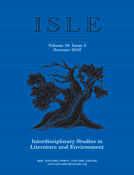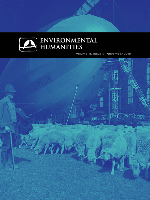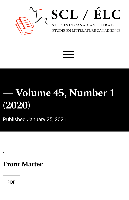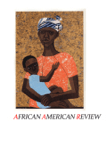
ISLE-Interdisciplinary Studies in Literature and Environment
Scope & Guideline
Unveiling Stories that Shape Our Ecological Understanding.
Introduction
Aims and Scopes
- Interdisciplinary Approaches to Environmental Literature:
The journal embraces a broad range of disciplines, including literary studies, environmental humanities, ecocriticism, and cultural studies, to analyze the intersection of literature and environmental issues. - Focus on Social Justice and Environmental Equity:
A consistent emphasis on environmental justice, decolonial narratives, and the representation of marginalized voices in literature, highlighting how literature can reflect and challenge ecological injustices. - Exploration of Nonhuman Perspectives:
Research often includes the perspectives of nonhuman entities, such as animals and plants, contributing to a deeper understanding of multispecies relationships and ecological interconnections. - Engagement with Climate Change Narratives:
The journal addresses the complexities of climate change through literary representations, examining how narratives can influence public perception and policy regarding ecological crises. - Creative and Poetic Expressions:
In addition to critical essays, the journal features poetry and creative works that explore environmental themes, showcasing the role of artistic expression in ecological discourse.
Trending and Emerging
- Decolonial and Indigenous Perspectives:
There is a growing emphasis on decolonial narratives and Indigenous environmental knowledge, exploring how literature can reflect and advocate for Indigenous rights and ecological wisdom. - Climate Justice and Activism:
Recent themes prominently feature climate justice, activism, and the role of literature in mobilizing social change, reflecting a heightened urgency in addressing climate crises. - Transcorporeality and Material Agency:
Emerging discussions focus on transcorporeality and the agency of materials, exploring how bodies and environments interact in complex ways, challenging the boundaries of human and nonhuman. - Ecofeminism and Intersectionality:
The intersection of ecofeminism with other social justice movements is gaining traction, highlighting how gender, race, and class intersect with environmental issues in literary contexts. - Digital and Multimodal Ecologies:
There is a noteworthy trend towards exploring digital ecologies and multimodal narratives, examining how digital media and literature intersect with environmental themes in contemporary contexts.
Declining or Waning
- Traditional Nature Writing:
There is a notable decrease in the publication of traditional nature writing, as contemporary scholarship increasingly favors interdisciplinary and critical approaches over romanticized depictions of nature. - Anthropocentric Narratives:
Research focusing solely on human-centered narratives is declining as the journal moves towards more inclusive and non-anthropocentric perspectives that acknowledge the agency of nonhuman entities. - Static Ecological Models:
The journal has shifted away from static models of ecology, favoring dynamic, intersectional approaches that consider the complexities and fluidities of ecological relationships. - Historical Ecocriticism:
While historical perspectives remain important, there is a reduced focus on traditional historical ecocriticism in favor of contemporary issues, particularly those related to urgent climate crises. - Overly Simplistic Environmental Solutions:
Papers that propose overly simplistic or one-dimensional solutions to environmental problems are becoming less frequent, as the discourse increasingly recognizes the need for multifaceted approaches.
Similar Journals

Environmental Humanities
Fostering Innovative Dialogues in Environmental ScholarshipEnvironmental Humanities, published by DUKE UNIVERSITY PRESS, is a premier journal that has established itself as a leading platform for interdisciplinary scholarship at the intersection of the environment and the humanities. With its open access framework since 2012, the journal fosters widespread dissemination of critical research that integrates perspectives from Anthropology, Ecology, and the Social Sciences. Currently holding impressive Q1 rankings in both Anthropology and Social Sciences for 2023, along with notable Q2 standings in Environmental Science fields, this journal provides a vital forum for innovative explorations of how human culture shapes and is shaped by environmental challenges. Situated in the United States, the journal encourages authors and thinkers to contribute to ongoing discussions about sustainability, ethics, and the cultural dimensions of environmental issues, making it an essential resource for researchers, professionals, and students alike. With a commitment to high-quality scholarship, Environmental Humanities plays a crucial role in advancing knowledge and understanding in a rapidly evolving field.

Revista de Letras Norte@mentos
Empowering Voices in the World of LiteratureRevista de Letras Norte@mentos is an esteemed academic journal published by UNIV ESTADO MATO GROSSO, focusing on the rich field of literature and linguistics. With its ISSN of 1983-8018, this Open Access journal has been granting unrestricted access to readers since 2008, fostering an inclusive environment for the dissemination of scholarly research within the literary community. Based in Brazil, specifically at AV TANCREDO NEVES 1095, CAVALHADA II, CACERES, MT 78200-000, the journal embraces diverse perspectives and discussions surrounding literary theories, cultural studies, and the evolving landscape of language. Although specific metrics such as the HIndex and Scopus ranking are currently not listed, the journal aims to establish a strong presence in the literary field, appealing to researchers, professionals, and students who are committed to advancing knowledge and insight. By promoting high-quality research and facilitating academic dialogue, Revista de Letras Norte@mentos plays a vital role in the ongoing exploration of literature and its impact on society.

Letteratura e Letterature
Advancing Interdisciplinary Insights in Literature and Linguistics.Letteratura e Letterature is a distinguished scholarly journal dedicated to exploring the nuances of literature and linguistic theory, published by FABRIZIO SERRA EDITORE. This journal, identifiable by its ISSN 1971-906X and E-ISSN 1973-2600, serves as a significant platform for researchers, professionals, and students engaged in critical discourse within the fields of Literature and Linguistics. With a focus on fostering interdisciplinary dialogues, it seeks to illuminate diverse literary phenomena and linguistic intricacies, contributing meaningfully to the academic community. Despite being categorized in the Q4 and Q3 quartiles in 2023, the journal remains a vital resource, encouraging innovative scholarship and broadening the understanding of literary and linguistic interactions. Although it does not currently offer open access, the journal promises rigorous peer-reviewed content, ensuring the quality of published research. Operating from its base in Pisa, Italy, the journal continues to embrace its converged years from 2014 to 2021 and the ongoing 2023 to 2024 period as an era for refined scholarship and vibrant academic exchange.

SHENANDOAH
Exploring the Intersections of Literature and NatureSHENANDOAH is a prestigious journal published by Washington Lee University, focusing on the rich tapestry of American literature, culture, and environmental studies. With its ISSN 0037-3583, this journal has served as a vital platform for the dissemination of scholarly research from 2002 to 2010 and again in 2012, although it has since discontinued its coverage in Scopus. The journal's commitment to exploring the intersections between literary expression and ecological awareness fosters a unique dialogue among researchers, professionals, and students interested in the human experience in relation to the natural world. By engaging with a diverse range of topics, SHENANDOAH not only enriches academic discourse but also invites contributions that illuminate the dynamic interplay between culture and environment. This makes it an essential resource for anyone looking to deepen their understanding of American studies and ecological literature.

STUDIES IN CANADIAN LITERATURE-ETUDES EN LITTERATURE CANADIENNE
Unveiling the Richness of Canadian NarrativesSTUDIES IN CANADIAN LITERATURE-ETUDES EN LITTERATURE CANADIENNE, published by the University of New Brunswick, is a leading academic journal dedicated to the exploration and analysis of literature in the Canadian context. With an ISSN of 0380-6995 and an E-ISSN of 1718-7850, this journal has been serving scholars, students, and professionals interested in the rich tapestry of Canadian literary studies since its inception. Recognized in the 2023 Q2 category in Literature and Literary Theory, and ranking in the 49th percentile of its field according to Scopus metrics, it provides a platform for innovative research, critical reviews, and theoretical discussions that deepen our understanding of Canadian literature. Although it is not an open-access journal, the rigorous peer-reviewed nature of its content ensures high standards of academic integrity, making it a valuable resource for anyone engaged in the literary arts. The journal covers a distinct range of topics, embracing both historical perspectives and contemporary issues, thus positioning itself as a vital scholarly contribution to the field.

Steinbeck Review
Illuminating Steinbeck's Literary ImpactThe Steinbeck Review, published by Penn State University Press, serves as a premier platform dedicated to the exploration and critical analysis of the works and legacy of John Steinbeck. With a focus on literature and literary theory, this journal offers valuable insights for researchers, scholars, and students engaged in Steinbeck studies and American literature at large. Although not an open-access journal, its contributions are invaluable, as evidenced by its current Q3 ranking in the field, placing it within the significant discourse of contemporary literary studies. The journal aims to foster a deeper understanding of Steinbeck's impact, examining thematic, historical, and cultural contexts surrounding his work. With a commitment to quality scholarship, the Steinbeck Review continues to inspire and challenge its readership, contributing to the ongoing conversation within the literary community.

AFRICAN AMERICAN REVIEW
Advancing Conversations on African American Cultural NarrativesAFRICAN AMERICAN REVIEW, published by the Johns Hopkins University Press, stands as a pivotal journal since its inception, dedicated to exploring the multifaceted aspects of African American literature, culture, and artistic expression. With an ISSN of 1062-4783 and an E-ISSN of 1945-6182, this journal provides a critical platform that delves into the rich tapestry of African American experiences, bridging gaps across literary, cultural, and visual arts disciplines. Its latest impact metrics position it in esteemed quartiles, achieving Q2 rank in both Literature and Literary Theory and Visual Arts and Performing Arts, alongside a strong presence in Cultural Studies with a Q3 classification. The journal’s commitment to high-quality scholarship is reflected in its Scopus rankings, drawing attention from researchers and scholars invested in cultural narratives and historical contexts. Although not currently open access, the journal's comprehensive analyses contribute significantly to discussions in academia and beyond, making it an essential resource for researchers, educators, and students alike looking to deepen their understanding of African American contributions to the arts and humanities.

CONTEMPORARY FRENCH AND FRANCOPHONE STUDIES
Connecting Ideas Across the Francophone SpectrumCONTEMPORARY FRENCH AND FRANCOPHONE STUDIES is a prestigious academic journal published by Routledge Journals, Taylor & Francis Ltd, focusing on the vibrant fields of French and Francophone literature, culture, and history. With an ISSN of 1740-9292 and an E-ISSN of 1740-9306, this journal serves as a vital platform for interdisciplinary research, highlighting innovative scholarship from 1997 through 2024. Recognized for its contributions to Cultural Studies, History, Literature and Literary Theory, and Visual Arts and Performing Arts, it holds a Q3 ranking in these categories as of 2023, indicating its solid reputation among peers. The journal is dedicated to fostering a deeper understanding of contemporary societal themes through the lens of Francophone perspectives, providing valuable insights for researchers, professionals, and students alike. It is crucial for those looking to engage critically with current trends and influences shaping the Francophone world.

OVERLAND
Illuminating the Intersection of Literature and SocietyOVERLAND is a distinguished journal published by O L Society Ltd in Australia, focusing on the fields of Literature and Literary Theory. With an ISSN of 0030-7416, this journal has been pivotal in fostering scholarly discussions and critical analyses within its domain. Notably categorized in the third quartile (Q3) in 2023, it ranks #904 out of 1106 in Scopus' Arts and Humanities section, indicating its emerging significance in literary studies, despite its current percentile of 18th. OVERLAND is not an open access journal, yet it serves as a crucial platform for researchers, professionals, and students alike, promoting a better understanding of contemporary literary landscapes. With a history of publication spanning from 2009 to 2013 and then again from 2015 through 2023, OVERLAND continues to encourage innovative scholarship and critical dialogue. This journal is essential for anyone seeking to deepen their understanding of literature's role in society and culture.

Chung Wai Literary Quarterly
Cultivating Insightful Dialogues in the Literary SphereChung Wai Literary Quarterly is a distinguished academic journal published by NATL TAIWAN UNIV PRESS, dedicated to advancing the study of literature and cultural discourse in the Chinese-speaking world. With its ISSN 0303-0849, this quarterly publication serves as a vital platform for scholars, students, and literary enthusiasts interested in exploring contemporary and classical literary themes through a critical lens. Although it does not currently offer open access options, the journal is well-regarded for its rigorous selection process and commitment to scholarly excellence. The editorial team curates a diverse range of articles that encompass literary critique, theoretical explorations, and interdisciplinary dialogues, contributing significantly to the academic conversation in this field. As it continues to bridge the gap between scholarly inquiry and practical engagement with literature, Chung Wai Literary Quarterly remains an essential resource for anyone seeking to deepen their understanding of literary studies and its broader implications.